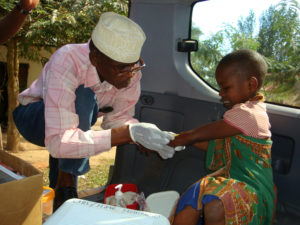The burden of tuberculosis (TB) is particularly high in Africa, where many overstretched health systems struggle to treat the disease with limited resources. According to the 2013 WHO Global Tuberculosis Report, approximately one-quarter of the world’s 8.6 million new TB cases in 2012 came from the African region. Making the problem more difficult is the fact that many African health systems are ill-equipped to fight drug-resistant TB—though most countries in the East Central and Southern Africa (ECSA) region have reported extensively drug-resistant cases.
In 2011 and 2012, the USAID-funded Systems for Improved Access to Pharmaceuticals and Services Program (SIAPS) conducted two African regional conferences on pharmaceutical management of TB medicines. Major challenges identified by regional participants were frequent stock-outs and overstocking, particularly for second-line TB medicines. ECSA countries are struggling to address these challenges and improve TB commodities availability and accessibility, and address weaknesses in TB logistics management information systems that have resulted in lack of quality data for informed TB interventions and decision making.

Intervention Process
The USAID East Africa Regional Office (EARO) requested SIAPS support for the ECSA regional health community secretariat (ECSAHC) to address recurrent TB pharmaceutical supply management issues, with a particular focus on data and medicines management.
Through consultations with ECSAHC and key stakeholders, SIAPS approached the process in three phases:
- Conducting a rapid situational analysis to obtain a current situation on TB data and commodities management
- Development of an ECSA strategy to strengthen TB data and commodities management
- Outlining the plan to implement ECSA strategy to strengthen TB data and commodities management in the region
Rapid Situation Analysis on ECSA TB Data and Commodities Management
A rapid situation analysis was conducted between June and August 2014 for four selected countries (Kenya, Tanzania, Malawi and Swaziland) to gain a better understanding of the TB supply chain management practices in member countries. Data was collected through review of key documents, including strategic plans, pharmaceutical policies, guidelines and protocols for TB management, assessments, and reports. In addition, NTPs were asked to fill in any gaps that could not be found in the mentioned documents. Key data elements included planning, governance, information management, supply chain functions and monitoring of TB supply chain performance. The situational analysis identified the following as key challenges facing ECSA region:
- Lack of a regional TB data and commodities management strategy that would address cross-country TB commodity management challenges.
- Weak supply chain performance monitoring (none of the countries was able to demonstrate a strong monitoring system for the TB commodities supply chain).
- Gaps in supply chain functions (e.g., procurement, quantification, and inventory management) are at different magnitudes; some countries are doing better than others in some specific areas.
Development of the First ECSA TB Data and Commodities Management Strategy
The situation analysis findings were disseminated in August 2014, at the ECSA TB experts’ forum in Arusha, Tanzania. Participants included national TB programs, ministries of health, medical stores departments, and development partners, including the GDF, GFATM, WHO, and USAID-EARO.
The ECSA TB experts’ forum deliberated in the situation analysis findings, proposing some priorities on which to focus. This led to the development of the first ECSA TB data and commodity management strategy to strengthen TB commodities data and management. The strategy focused on the following key highlights:
- Establishing a platform for TB commodities and information management for the ECSA-HC member states
- Improving supply chain management of TB commodities
- Strengthening HR capacity on TB commodity management within the ECSA health community
- Strengthening TB lab commodities and data management among ECSA member states
Outlining the plan to implement the ECSA TB data and commodities management strategy
After the development of an ECSA strategy, SIAPS supported ECSAHC in outlining a detailed implementation plan to strengthen TB data and commodities management. The plan outlines activities, implementation arrangements, possible implications, and the key results and monitoring points.

